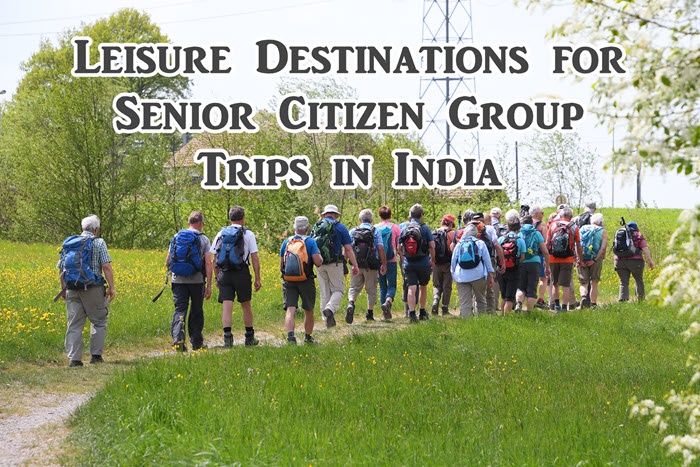Senior citizen trips offer a unique blend of exploration, relaxation, and rejuvenation. Whether you envision an adventurous trek through breathtaking landscapes, a tranquil escape to a serene spa, or an enriching cultural immersion, the possibilities are as diverse as the individuals embarking on these journeys. This guide delves into the essential aspects of planning and executing a memorable and fulfilling senior citizen trip, addressing considerations ranging from budgeting and accessibility to health and safety.
From meticulously crafting itineraries that cater to varying levels of mobility to ensuring seamless travel arrangements and access to essential medical resources, we aim to empower seniors to embark on their adventures with confidence and peace of mind. We explore diverse trip types, highlighting the unique benefits and challenges of each, and offer practical advice on making the most of every moment, fostering both personal enrichment and social connections.
Accessibility and Accommodation
Ensuring comfortable and safe travel for senior citizens requires careful consideration of accessibility needs. Many seniors have varying degrees of mobility, and trip planning must accommodate these differences to promote a positive and enjoyable experience. Failure to address accessibility can lead to significant discomfort and even safety hazards.
Accessibility features are crucial for ensuring senior citizens can fully participate in all aspects of their trip. This includes easy navigation, comfortable seating, and readily available assistance. Furthermore, the level of support required can vary greatly from individual to individual, necessitating flexible and adaptable solutions.
Transportation Accessibility Features
Transportation accessibility is paramount. Consideration should be given to the ease of boarding and disembarking vehicles, the availability of ramps and lifts, and the presence of adequate handrails for support. For example, motorcoaches designed for senior tours often include features such as kneeling buses, which lower the vehicle to the ground for easier entry, and wider aisles for wheelchair and walker users. Clearly marked and accessible restrooms on board are also essential. Furthermore, pre-arranged assistance with luggage and mobility aids should be readily available.
Accommodation Accessibility Features
Hotels and other accommodations should offer a range of accessibility features to meet diverse needs. Wheelchair-accessible rooms with roll-in showers, grab bars in bathrooms, and lowered countertops are essential. Easy-to-navigate layouts, with clear signage and wider doorways, are also crucial. For instance, many hotels now offer rooms with adjustable beds and emergency call buttons within easy reach. Some hotels even offer specialized equipment like adjustable shower chairs upon request.
Questions Seniors Should Ask When Booking Accommodations
Before booking accommodations, seniors should confirm the availability of specific accessibility features relevant to their individual needs. This includes inquiring about the number and type of accessible rooms, the dimensions of doorways and hallways, the availability of ramps and elevators, and the location of accessible restrooms. They should also ask about the availability of assistive devices, such as wheelchairs or walkers, and inquire about the availability of assistance with luggage and other needs. Finally, it is important to clarify the hotel’s policies regarding service animals.
Social and Emotional Aspects
Travel offers significant social and emotional benefits for senior citizens, enriching their lives in ways that extend far beyond the simple act of sightseeing. The opportunity to connect with others, explore new environments, and engage in stimulating activities can contribute significantly to overall well-being and a greater sense of purpose in later life.
Travel fosters companionship and social interaction, combating feelings of loneliness and isolation that can be prevalent among older adults. Shared experiences create lasting bonds, fostering a sense of belonging and mutual support. The stimulating environment of travel encourages conversation and interaction, providing opportunities to build new friendships and strengthen existing ones. This social engagement is vital for maintaining cognitive function and emotional health.
Enhanced Well-being Through Social Interaction
Participating in group tours specifically designed for senior citizens provides a structured environment for socialization. These tours often incorporate activities that encourage interaction, such as group dinners, shared excursions, and planned social events. The shared interests and life experiences of fellow travelers create a natural sense of camaraderie and understanding. For example, a tour focusing on historical sites might include discussions and shared learning experiences, fostering connection through a shared passion. Similarly, a cruise designed for seniors might offer various onboard activities like card games, dance classes, or themed parties, providing ample opportunities for social interaction and the formation of new friendships. Travel companions, whether friends, family, or even professional travel companions hired specifically for senior travelers, provide a constant source of support and companionship, reducing feelings of vulnerability and enhancing the overall travel experience.
Fulfillment and Purpose in Later Life
Travel can be a powerful catalyst for a renewed sense of purpose and fulfillment in later life. The act of planning a trip, researching destinations, and anticipating new experiences can itself be invigorating and mentally stimulating. Experiencing new cultures, exploring unfamiliar landscapes, and engaging in new activities can foster a sense of personal growth and accomplishment. For example, a senior citizen who has always dreamed of visiting a particular country might find immense satisfaction in finally realizing that dream, adding a significant chapter to their life story. The opportunity to learn new skills, whether it’s mastering a new language in preparation for a trip or developing photography skills to document their travels, provides a sense of purpose and personal achievement. This sense of accomplishment can be particularly beneficial for seniors who may be experiencing a transition to retirement or facing other life changes that can lead to feelings of decreased purpose.
Examples of Senior-Specific Travel Arrangements
Many tour operators specialize in creating travel experiences specifically tailored to the needs and interests of senior citizens. These tours often prioritize comfort, accessibility, and pace, ensuring a relaxed and enjoyable experience. For instance, some companies offer escorted tours with experienced guides who cater specifically to the needs of older adults, providing assistance and support throughout the journey. Other examples include river cruises, which often feature gentle itineraries and convenient onboard amenities, and small group tours focusing on specific interests, such as history, art, or nature, that cater to a more intimate and engaging experience. These options provide a structured and supportive environment where seniors can socialize and connect with like-minded individuals while enjoying the benefits of travel.
Final Thoughts
Ultimately, the ideal senior citizen trip is a personalized experience tailored to individual preferences and capabilities. By carefully considering the factors outlined in this guide—from meticulous planning and budgeting to prioritizing health and safety—seniors can confidently embark on journeys that enrich their lives, create lasting memories, and foster a profound sense of fulfillment. The rewards of exploring new horizons and forging meaningful connections far outweigh any perceived challenges, ensuring an unforgettable and enriching travel experience.




